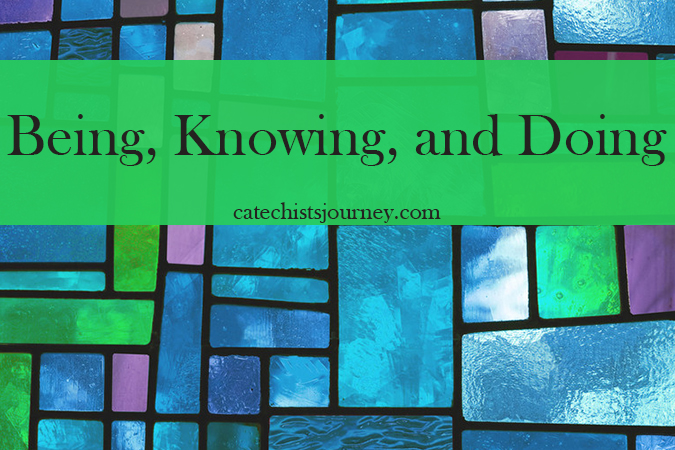
Early autumn, which coincides with the beginning of many religious education programs, is a good time to pay attention to forming catechists—especially those who are new to the ministry and are eager to learn the knowledge and skills needed to proclaim the Good News effectively!
With that in mind, we’re going to take a closer look at the three dimensions of catechist formation: Being, Knowing, and Doing. These will ensure that your catechists are fully formed and well-rounded. Let’s begin with the aspect of Being.
Years ago, there was a movie called The Right Stuff, which told the story of the first American astronauts (the Mercury 7) and the personal attributes and character traits they possessed that made them suitable for the pioneering task at hand. We refer to people having the “right stuff,” meaning that they have the necessary or ideal qualities or capabilities needed for a specific situation or task.
Catechists need to have the “right stuff” if they are to be effective, and this means more than simply possessing encyclopedic knowledge of the faith or flashy teaching skills. It means being people who possess virtues and qualities that enable them to flourish as healthy human beings and authentic disciples of Christ. Before we give potential catechists a test to see if they know the Catholic faith or have them audition to demonstrate their teaching skills, we want to know that they are “put together” well.
Likewise, while a textbook or video can show how to pray the Sign of the Cross or recite traditional prayers, it cannot share or teach about an affective relationship with God. This can only be accomplished by a human being, namely the catechist. Only a human being can answer questions, guide conversation, tell personal stories, share feelings, empathize, or articulate the experience of mystery. Only a human being can lift up his or her heart to God and invite others to do the same. Only a human being can truly accompany another human being.
Therefore, the person of the catechist is crucial to the process of evangelization and catechesis. Serving as a catechist is a vocation—a calling from God. A vocation, like a plant, needs to be nurtured. Just as we make sure that a plant receives water, sunlight, and the nutrients it needs to grow and thrive, we also need to make sure that the vocation of each catechist is being nurtured.
Catechist formation, then, should help people to mature as human beings. It should help them grow in their emotional health, their ability to think critically, their ability to relate to others in a healthy manner, and, above all, it should enable them to grow in holiness.
The Catechetical Formation Series, which I wrote and co-hosted with Deirdre Mullane, focuses on the three dimensions of Being, Knowing, and Doing. Below is a sampling of slides from session 10 (The Person of the Catechist), which focuses on the aspect of Being.
Here is a sample of the free downloadable PDF for the above session.
Access the Catechetical Formation Series here, and benefit from solid three-dimensional catechist formation (Being, Knowing, and Doing). Likewise, be sure to check out The Catechist’s Backpack: Spiritual Essentials for the Journey—a book that I co-wrote with the brilliantly talented Julianne Stanz and a resource that will help you focus on the Being dimension of your formation. If you are a catechetical leader and are looking to purchase the book in bulk for your catechists, you can get them for $6 each when you buy 15 or more books (in any combination) from the Toolbox series.




WOW! I came upon this “By ACCIDENT”? and am really grateful. It’s been a Very long time from my initial CATECHETICAL TRAINING. I am very happy about this series. Thank you!
Glad you “found us” Theresa!